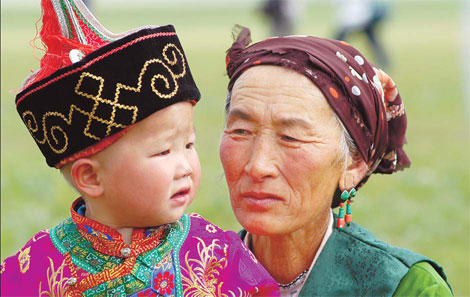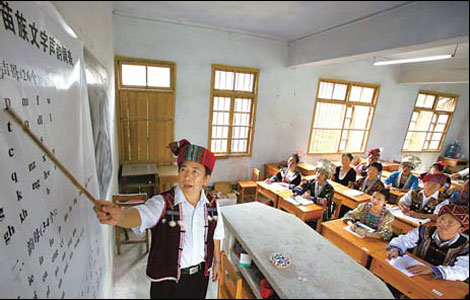Finding their voice
Hulunbuir in Inner Mongolia autonomous region is a place of rich linguistic resources. Located on the northeastern corner of China and neighboring Russia and Mongolia, the area has a number of resident ethnic groups that have their own cultures and languages.
However, modernization and urbanization mean that more people in the area are adopting Putonghua, or Mandarin, as their main language and forsaking their own.
"Many people of my parents' generation cannot speak Putonghua. People of my age usually can speak both languages, but are better at Ewenki," says Eerdemutu, a 38-year-old Ewenki man who lives in the Ewenki autonomous banner of Hulunbuir.
"Now my daughter speaks much better Putonghua than Ewenki. I don't know what will happen to the next generation," says Eerdemutu.
Ewenki is a purely spoken language and Eerdemutu says that because there is no Ewenki language pre-school education available, his daughter has received education in Putonghua since a very young age.
|
|
|
Mongolians, one of the largest ethnic groups in China, face up to declining usage of their language. [Asia News Photo] |
With a population of about 30,000, Ewenki is one of China's smallest ethnic groups.
The situation with the language of the Oroqen, an ethnic group of only some 8,200 people, is even more acute.
Anthropologist Bai Lan, who is Oroqen, estimates that only 20 percent of the ethnic group speak fluent Oroqen today, while almost none of the young people under 20 can really speak the language.
American linguist Michael E. Krauss defines languages as "endangered" if children will probably not be speaking them in 100 years, and "moribund" if children are not speaking them now.
It is not only the ethnic groups with lesser populations whose languages are under threat, the Mongolian, which has a population of nearly 6 million, is also facing the problem of declining usage of the native language.
According to the "Regulations on Spoken and Written Languages of Inner Mongolia Autonomous Region", enacted in 2005, "Mongolian is the standard common spoken and written language in the Inner Mongolian autonomous region, and is an important tool for the exercise of autonomy. Governments at various levels should popularize standard Mongolian pronunciation and unify standard Mongolian characters."
Bateer, director of the Institute of Mongolian Language Study, Inner Mongolia Academy of Social Sciences, has done field research about native language usage all over Inner Mongolia. He says that the more urbanized a place is, the lower the level of native language usage is.
"The problem is that it is hard for young people to find jobs with their native languages," Bateer says. "To save native languages, we have to create a better environment for the their use."
|
|
|
A bilingual training program helps teachers from the Miao ethnic group grasp their native language and Mandarin. [Asia News Photo] |
Bateer contends the government needs to come up with policies more favorable for the usage of minority languages, for example, giving priority to people who speak minority languages when recruiting civil servants. He also suggests that China learn from the measures that the Quebec province of Canada takes to protect its usage of French.
There are 56 officially recognized ethnic groups in China. Minority people account for some 8 percent of China's total population, yet their autonomous areas occupy 64 percent of China.
Almost all the ethnic groups have their own languages, and many have more than one. So far linguists have identified 134 spoken languages in China, which belong to five language families: Sino-Tibetan, Altaic, Austronesian, Austroasiatic and Indo-European. Apart from these, there are some mixed languages as well. There are over 60 written languages in the country and 17 of them were created after the founding of New China in 1949.
With the development of the economy, many areas that used to be closed to the outside world are receiving more and more external influence, which puts some of the native languages in danger.
"As far as the function of languages as vehicles of communication is concerned, the less the number of languages there is in the world, the more convenient it is for communication and intellectual exchange," says Sun Hongkai, honorary president of the Chinese Association on Minority Languages.
"However, languages are also physical media of diverse cultures and unique knowledge accumulated over millennia by their speakers."
For Sun, an ideal environment for languages would be one in which "multiple languages coexist side by side and are to be used simultaneously in different social contexts by promoting their respective strong points, and exerting their respective functions".
China has been carrying out a bilingual educational system in most of the minority areas.
In Tibet, educational institutions practice "a bilingual educational system whereby teaching is done principally in the Tibetan language", according to the White Paper on Tibetan Culture released in 2008 by the Information Office of the State Council.
In Xinjiang, the central and Xinjiang governments plan to invest 5.1 billion yuan ($751,000) by 2012 on bilingual education in the area, where a substantial number of ethnic groups like Uygur, Kazak, Uzbek and Xibe speak their own languages.
Ghayrat Abdurahman, deputy director of the Institute of Linguistics, Xinjiang Academy of Social Sciences, says that bilingual education helps local people to shorten the distance of development from more advanced areas, but the ideal model for bilingual education still needs to be studied.
"There are problems in terms of textbooks, teachers and curriculum. Without a sound system, students might not be able to study either language well," he says.
At his institute, Ghayrat is now hosting a project to investigate the problems in the bilingual education of Xinjiang.
"We must not lose our native languages, for that is our cultural identity, and at the same time a minority student also needs to study Chinese well, so that he or she will have a wider view and more opportunities to develop a career," he says.
 0
0 









Go to Forum >>0 Comments